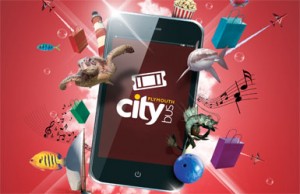Case Study:
Plymouth City Bus
Plymouth’s Citybus wanted to get a younger audience on board with a campaign to drive awareness of its cutting edge new app.
The brief
A smart phone is the modern equivalent of a Swiss army knife – a small pocket device that can make a big difference to a stressful day. The wide assortment of apps that can be added to smart phones has made daily lives lives more convenient than ever before – to date the number of apps available from Apple’s App Store has soared to 775,000.
Plymouth based company, Citybus, launched a campaign,“Plymouth in your pocket”, to promote its new app and sought to play on this simple concept of handiness. It also wanted a campaign that would provide cut through to its target audience of younger passengers aged 18 to 34.The Citybus customer database suggested a significant proportion of bus users were younger people and students.
Citybus was confident that a large proportion of its customers were smart phone users because records showed that 50 per cent of visitors to its website log on using mobile devices, a leap of 23 per cent compared to two years ago.
Plymouth Citybus marketing manager Mark Collins says: “We created the app as an additional channel to market our service and to improve efficiency levels, for both our passengers and own business. The idea is to reduce queues for tickets and the time spent by bus drivers fiddling with change.”
The Citybus mobile app allows customers to buy tickets, see prices, link to Google Maps and view a Twitter feed of traffic updates. Passengers scan their smart phone when they board a bus instead of using a paper ticket.
The campaign focussed on younger people. This was based on widespread evidence that smart phones are used more by young people than other demographic groups. Telecoms regulator Ofcom, for example, has found that while 39 per cent of adults owned a smart phone in 2012, this figure rose to 66 per cent among 16 to 24 year olds and 60 per cent among 25 to 34 year olds.
Citybus estimated the app could appeal to at least 7,000 who already engage with its brand online. The company has just over 6,500 “likes” on Facebook and 3,185 followers on Twitter.
Agency Bluestone360 was commissioned to deliver the campaign, which launched on 1 September 2012 and is ongoing. “We asked Bluestone360 for creative that matched the innovative nature of the product and reflected how it would conveniently help people get the best out of the city,” says Collins.
Bluestone created a campaign that emphasised how the app would allow people to access activities in Plymouth, make life easier and save time. The slogan of the £20,000 campaign was “Plymouth in your pocket”.
The creative shows the glinting screen of an iPhone with various images leaping off it towards the viewer. Each image represents an activity, including a shark for the city’s aquarium, a carton of popcorn for the cinema, a bowling ball for the bowling alley and so on. “We wanted artwork that jumped off the page to give the campaign energy and appeal to younger people, who we knew would be more likely to use apps,” says Collins.
The execution
The campaign was multi-channel. Citybus wrapped an advert around one of its buses, e-mailed its database and alerted online followers and friends. Posters were placed at its bus stops and bus shelters, and sent to shops that sell bus tickets.
Two full-page adverts were placed in the most widely read local paper in the area, the Plymouth Herald. “We also took all the advertising space on the Plymouth Herald’s homepage for five days,” says Bluestone 360’s account manger Daniel Porter.
The adverts included a QR code to encourage people to download the app.“This allows people to scan the code with their phone and get onto it immediately. Once they’ve put their card details in, they are ready to start buying tickets,” says Porter.
The campaign featured a promotional incentive, entering people who downloaded the app within the first six weeks of the campaign into a draw to win an iPhone.
A large proportion of the adverting space was secured at no cost because adverts featured on buses owned by the client. As a result the campaign cost £10,000, 50 per cent below budget. Collins says: “Effectively free advertising space allowed us to punch much higher than our weight. Just to have the bus alone for advertising would normally cost around £12,000 a year.”
The target for the campaign was 1,000 downloads in the first three months. In fact the app was downloaded 1,000 times in the campaign’s first week. Since the app went live in August, it has seen 4,563 downloads.
Less impressively, perhaps, the conversion rate – the amount of people who actually buy tickets after downloading the app – is 25.6 per cent. The number of tickets sold through the app so far stands at 3,446, while Citybus sees some 22,000 tickets bought every day.
Analysis
Porter insists he is pleased with the conversion rate, however. “We don’t have anything to compare it to, so it’s hard to gauge, but we are happy with it because it does clearly show the changing behaviour of an audience,” he explainshe app was free to download, so Citybus did not have financial targets for the campaign.
However, Collins believes increasing use of the app will save money in terms of the reduced manpower that will be needed to sell tickets. “We’ll be able to reinvest those savings in further innovation, ” he says.
Collins says Citybus would not change anything about the campaign but admits the challenge will now be to maintain the momentum. Regular updates are standard practice for apps and Citybus plans to update Plymouthbus Mobile by adding a journey planner function. “We will want to promote the updated app but we would have to justify the extra marketing spend and it’s clear that each new update will bring that challenge,” he says.

